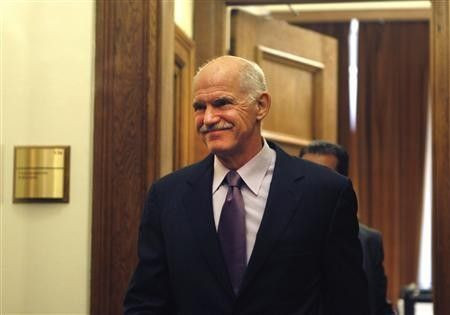Greek Leaders Set to Pick New PM, Media Tips Papademos

ATHENS (Reuters) - Greek political leaders were set to choose who will lead a new coalition on Monday and push through a bailout before the country runs out of money in mid-December, with local media tipping former ECB deputy head Lucas Papademos for the job.
With the European Union demanding a quick resolution to Greece's political crisis, Prime Minister George Papandreou sealed a deal on Sunday with the opposition on a crisis coalition to approve an international financial aid package.
Details of the deal remain sketchy, and both sides must now agree on a common candidate for prime minister. Papademos, who as Bank of Greece governor oversaw its joining the euro zone, is front runner, Greek media said.
Greek bank shares, the country's best market benchmark of fiscal health with the government shut out of bond markets, rose 3 percent.
The coalition agreement came after the EU told political parties to explain by Monday how they would form a unity government to get the 130-billion-euro ($180-billion) funding.
Papandreou, who sealed his fate last week with an attempt to call a referendum on the bailout, will stand down when the new government takes over.
He and conservative leader Antonis Samaras came up with the bare minimum late on Sunday to satisfy Brussels, where Greek Finance Minister Evangelos Venizelos is to brief the Eurogroup on progress later on Monday.
Papandreou and Samaras -- who were university roommates in Boston in the 1970s before becoming arch-rivals in Athens -- are expected to talk by phone on Monday to discuss the deal.
A new coalition would be sworn in and hold a confidence vote within a week, if all went to plan, the government says.
Finally! the center-left daily Ta Nea said on its front page on Monday. The first, big step has been taken to save the country. Conservative daily Kathimerini wrote: A first win.
Others were less charitable. I'm afraid the new government will very soon turn out to be problematic, said Stefanos Manos, a conservative former finance minister.
In an early sign that any broad compromise will be hard to achieve, President Karolos Papoulias's plan to summon the heads of all leading parties for more negotiations on Monday was canceled after two leftist parties refused to attend.
SCEPTICISM ON THE STREET
Many Greeks remained sceptical.
Are we saved? I don't think so if nothing is done to stop this practice of slapping more and more taxes because people's pockets will be empty, said Nikos Stratakis, 49, a taxi driver, referring to two years of cuts to pay, pensions and jobs.
Hurrah, we are saved! said plumber George Vihos Weren't we the ones who did not want these austerity measures? Why should we celebrate now that they will make sure we bear the pain.
The new coalition must win parliamentary approval for the bailout before calling early elections, now set for February 19 as agreed by Papandreou's socialist PASOK party and the New Democracy party of Samaras early on Monday.
Brussels has piled pressure on Athens to approve the bailout, a last financial lifeline for Greece, fearing that its crisis will spill into much bigger euro zone economies such as Italy and Spain -- which would be far harder to rescue.
Earlier, European Economic and Monetary Affairs Commissioner Olli Rehn told Reuters that euro zone finance ministers would insist on hearing a plan for a unity government from their Greek colleague Evangelos Venizelos at Monday's Eurogroup meeting.
We have called for a national unity government and remain persuaded that it is the convincing way of restoring confidence and meeting the commitments, he told Reuters. We need a convincing report on this by Finance Minister Venizelos tomorrow in the Eurogroup.
Papandreou had sought the referendum to show that harsh cuts demanded in the bailout had public support, but the risk that a no vote could bring about a sudden bankruptcy caused mayhem in markets and unrest in the ruling party.
He soon ditched the idea and won a confidence vote in parliament, but only after promising to make way for the national unity coalition.
The coalition deal is unlikely to calm Greek politics.
Whoever becomes premier will struggle to exert his authority as party leaders run things behind the scenes, said Manos.
The civil service won't implement any decision and everyone will be waiting for the election, he said.
Papandreou and Samaras had to bury deep differences and personal animosity to tackle Greece's economic, political and social crisis; its future in the euro zone is in question, and their reputations among ordinary Greeks are at rock bottom.
The two leaders had no other choice. If elections were held now, nobody would turn out to vote for them, said political science professor Elias Nikolakopoulos at Athens University.
© Copyright Thomson Reuters 2024. All rights reserved.




















